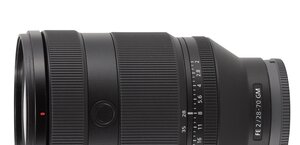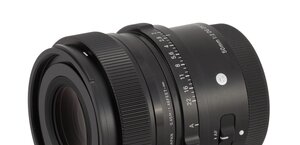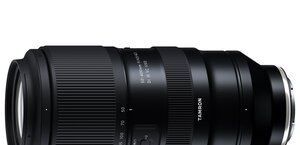Fujifilm Fujinon XF 23 mm f/1.4 R
3. Build quality
However the physical dimensions of the Fujinon can impress only among mirrorless system lenses. If you compare it to its full frame equivalents it will seem really small – just look at the photo with the Fujinon 1.4/23 positioned next to the full frame Sigma 1.4/35 and the Zeiss Macro-Planar 2.0/50.
 |
Please Support UsIf you enjoy our reviews and articles, and you want us to continue our work please, support our website by donating through PayPal. The funds are going to be used for paying our editorial team, renting servers, and equipping our testing studio; only that way we will be able to continue providing you interesting content for free. |
- - - - - - - - - - - - - - - - - - - - - - - - - - - - - - - - - - - - - - - - - - - - - - - -
The tested lens starts with a metal mount which surrounds contacts and a rear element, 24 mm in diameter. The proper body of the lens, made of metal, starts with and an immobile, smooth ring. On that ring you can find a red rectangle which makes the alignment with a camera body easier, a focus marker, a serial number and information that the lens was produced in Japan.
 |
The next part is a ribbed aperture ring, 11 mm wide, which click stops for each intermediate 1/3 EV stop setting. The ring is well damped and a joy to use.
Behind another immobile ring belonging to the proper casing you see a ribbed manual focusing ring. It is 18 mm wide and you can slide it up and down. If it is pushed the closest to the front element system it can’t be turned. If you slide it downwards it reveals a distance scale, expressed in feet and meters, and you engage in a normal, mechanical mode (so the autofocus stops working). The ring is a joy to use, smooth and well-damped, making the adjustments a pleasure to apply. Running through the whole distance scale needs a turn through about 150 degrees; such an angle allows you very precise settings.
 |
Personally I prefer classic, manual focus rings so I enjoy the fact that there are no servomechanisms here. Still you have to remember that you must pay for it – there is no distance scale (and no depth of field markings) on the LCD screen. Fortunately over the distance scale you get a classic, depth of field scale, painted on the casing, for all (sic !) aperture values, offered by the lens.
It’s worth adding that the up and down movement of the focusing ring is very stable, without any abrupt change of the position set on the scale. It is a nice performance, especially compared to the way a similar mechanism works in e.g. Tokina lenses.
 |
Behind the depth of field scale you can find a hood mount. Its outer part features a non-rotating filter thread, 62 mm in diameter. The thread surrounds an inscription with the name and the parameters of the lens. The front element doesn’t move and is slightly convex, with a diameter of 36 mm.
 |
The optical construction of the lens consists of 11 elements positioned in 8 groups. Among them there is one aspherical element. The producer doesn’t boast of using any low dispersion elements or ones with untypical diffraction index which is a bit strange when it comes to this type of construction. Inside you can also find a rounded aperture with seven diaphragm blades which can be closed down to f/22.
 |
Buyers get both caps, a hood and a soft pouch in the box.






